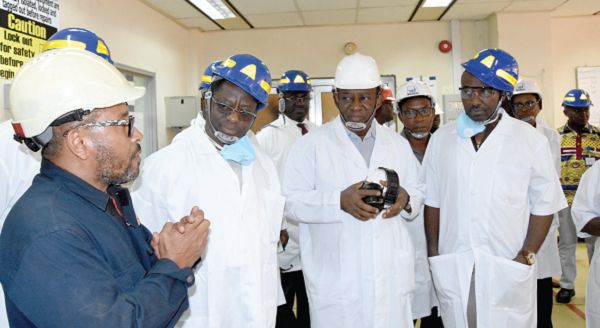
TOR requires US$500m to revamp operations — Isaac Osei
Maxwell Akalaare Adombila
Business News
The Tema Oil Refinery (TOR) is aiming to holistically tackle the country’s chronic reliance on imports for refined petroleum products.
With installed capacity of 45,000 barrels per stream day (bpsd), TOR says it will cost some US$500 million per annum for the refinery to be sustainable and refine enough products to meet annual demand, which currently costs the nation an average of US$1.2 billion to import on annual basis.
The Managing Director of TOR, Mr Isaac Osei, explained last Wednesday that the loss of foreign exchange (FX) was needless, especially given the impact on the cedi’s strength.
As a result, he said there was a business case for the country and the government, in particular, to support the refinery’s ongoing revival process to help avoid the FX drain on the economy.
“When TOR is operating, in the whole year, we will probably spend about US$500 million.
But for the same products, industry will probably spend about US$1.2 billion and so it is important that TOR works,” Mr Osei told the Minister of Energy, Mr John Peter Amewu, when he and his entourage paid a familiarisation visit to TOR.
“That kind of leakage from our own country in terms of FX clearly puts pressure on the cedi,” he said.
Last year, imports of refined petroleum products grew by 15.7 per cent to almost US$2 billion, although national consumption declined to 3.46 million tonnes.
Greenfield refinery
Beyond requiring revamping its current operations, Mr Osei said TOR was also working to raise its installed capacity to 60,000 bspd to help meet national consumption and leave some for exports.
In the long term, he said the refinery would also partner an investor to establish a US$3.5 billion Greenfield refinery with installed capacity of 150,000 bpsd, more than triple of its current capacity of 45,000 bpsd.
He told the GRAPHIC BUSINESS after the minister’s tour that the board and management had since engaged a transaction advisor to guide in structuring a financial arrangement and also securing a strategic investor to execute the deal.
TOR, he said, had already engaged several partners for discussions around the Greenfield refinery to be sited at Prampram in the Greater Accra Region.
“We have appointed a transactions advisor to advise us and look at the alternative.
Beyond the recommendations of the transaction advisor, Mr Osei said TOR would consult the Ministries of Finance and Energy to settle on the right investor.
Oil price crash
Until October this year, TOR had not been able to secure crude oil on its own account to refine since 2014.
Rather, it engaged in tolling for third parties due to lack of finance to secure crude oil supply deals.
In October, however, it secured some 947,000 barrels from BP Petroleum International on credit to resume processing, after partially cleaning up its books and restructuring TOR’s operations.
The MD told the minister that although it was a giant step in the revival process, the crash in oil prices, following the delivery of the crude oil, had affected revenue projections from the supply deal.
“Since we bought our crude oil, the price of crude has gone down quite substantially.
From around US$83, now we are talking of mid US$60.
“So, clearly, we will not realise the generation of funds that we had expected at the beginning of the arrangement,” he said, but explained that management was taking remedial steps to help mitigate the impact.
One of them, he said, was to increase the quantity of products that were blended – something that was originally not in the plan.
Mr Osei was confident that increased blending would raise revenue generation to help make up for the losses emanating from the price crash.
“So, we are doing a lot of blending for not just ourselves but third parties,” he said.
He mentioned condensate and premix fuel as something of the products that TOR would be investing in.
Consult before
In response, Mr Amewu advised TOR to consult the Ministries of Energy and Finance in subsequent crude oil purchase arrangements to help benefit from expertise that would mitigate the impact of risks.
“Market risk is important because if you are losing about US$10 to US$18 per barrel of crude, that translates into something huge.
“Let us analyse the market very well and make sure that we understand how it works. Fortunately, we have quality people, those here who understand the economics and can predict how the price behaves,” he said.
Mr Amewu’s visit to TOR was his first after replacing Mr Boakye Agyarko this year.